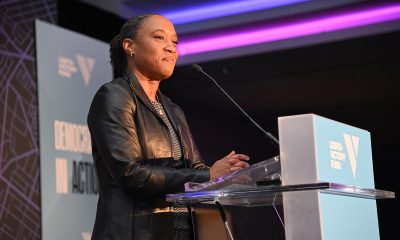National
Dems approve marriage-equality inclusive platform
Next step is approval by delegates in Charlotte

A committee of more than 100 Democrats unanimously approved on Saturday a version of their party’s platform that includes a plank endorsing marriage equality as well as other pro-LGBT language.
The full platform committee, which consists of around 120 Democrats, gave the OK to the manifesto following a meeting in Detroit, Mich., that was chaired by retired Lt. Gen. Claudia Kennedy, the first woman to reach the rank of three-star general, and Newark Mayor Cory Booker. During the several hour long meeting, members offered views on principles to advocate for within the party and proposed amendments to the platform.
Language on marriage equality — which is being included in the Democratic Party platform for the first time — was accepted without amendment and without significant discussion.
Among the committee members who delivered remarks was Scott Dibble, a gay state senator from Minnesota, who said he’s “extremely pleased” with the marriage equality plank, saying the language “should be taken as an affirmation on something that we all value and cherish, and that is what marriage means and that marriage really matters.”
“This has certainly been a journey for many people in this country,” Dibble said. “It’s been a journey for our president, and I’m very proud of our president [for] having stood and said all families matter. And Mr. Chair and Madam Chair and members, young people are looking for a political home right now and that has become one of the defining moral questions of our time and our moment.”
Speaking with the Washington Blade by phone after the vote, Dibble said he wasn’t surprised the full platform committee accepted the marriage equality without any challenges.
“I wasn’t surprised, but I was pretty happy that there was no discussion, no controversy,” Dibble said. “I wasn’t sure whether or not I was expected any, but it was great. There seemed to be a lot of good feeling and felt a lot of really positive energy around on the the idea of including the plank.”
The Washington Blade first reported on July 30 that the Democratic Party platform drafting committee had agreed to adopt a marriage equality plank in the platform as well as language rejecting the Defense of Marriage Act and affirming the Employment Non-Discrimination Act.
The platform hasn’t officially been made public, nor has any language related to LGBT issues. However, language first reported by Buzzfeed and later confirmed by the Blade has shown it affirms marriage equality, rejects DOMA while respecting religious liberties.
“We support the right of all families to have equal respect, responsibilities, and protections under the law,” the language states. “We support marriage equality and support the movement to secure equal treatment under law for same-sex couples. We also support the freedom of churches and religious entities to decide how to administer marriage as a religious sacrament without government interference.”
The language continues, “We oppose discriminatory federal and state constitutional amendments and other attempts to deny equal protection of the laws to committed same-sex couples who seek the same respect and responsibilities as other married couples. We support the full repeal of the so-called Defense of Marriage Act and the passage of the Respect for Marriage Act.”
Other pro-LGBT language related to the Employment Non-Discrimination Act and bullying was also left intact by the committee. Some advocates, including the American Civil Liberties Union, were hoping for an explicit endorsement of anti-bullying bills like the Student Non-Discrimination Act and the Safe School Improvement Act, but that language isn’t in the platform.
“We know that putting America back to work is job one, and we are committed to ensuring Americans do not face employment discrimination,” the languages states. “We support the Employment Non-Discrimination Act because people should not be fired based on their sexual orientation or gender identity.”
The language continues, “President Obama and the Democratic Party are committed to ensuring all Americans are treated fairly. This administration hosted the first-ever White House Conference on Bullying Prevention and we must continue our work to prevent vicious bullying of young people and support LGBT youth. The President’s record, from ending ‘Don’t Ask, Don’t Tell’ in full cooperation with our military leadership, to passing the Matthew Shepard and James Byrd Jr. Hate Crimes Prevention Act, to ensuring same-sex couples can visit each other in the hospital, reflects Democrats’ belief that all Americans deserve the same chance to pursue happiness, earn a living, be safe in their communities, serve their country, and take care of the ones they love.”
But additional LGBT language was placed into the platform during the hearing. The immigration reform language was amended to include the following: “the administration has said that the word ‘family’ in immigration includes LGBT relationships in order to protect binational families threatened with deportation.” The amendment was offered by Tobias Wolff, a gay University of Pennsylvania law professor and member of the platform committee.
The next step in the process is sending the platform to delegates at the Democratic National Convention, which will be held in Charlotte, N.C., during the week of September 3. Delegates at the convention will vote on giving the platform final approval.
Evan Wolfson, president of Freedom to Marry, whose organization has been leading the fight for the marriage equality plank in the platform, praised committee for giving its approval for an inclusive document.
“Today’s vote to include language supporting the freedom to marry in the Democratic Party ‘s National Platform is a victory for fairness and families, and a historic moment long in the making,” Wolfson said. “Support for the freedom to marry puts the party on the right side of history, and in the solid mainstream of the majority of the American people. Freedom to Marry applauds the Democratic Party for its fidelity to bedrock American values of the pursuit of happiness, liberty, and justice for all, and for its vision of an America that respects all families and honors commitment and love.”
Darlene Nipper, executive director of the National Gay & Lesbian Task Force, also had good words to say about the LGBT language in the platform.
“Support for marriage equality and ENDA, as well as against DOMA, in the draft platform is good politics and makes good sense,” Nipper said. “It is fully in step with how the entire country is moving on marriage, and the public has overwhelmingly supported employment protections for LGBT people for many years.”
NOTE: This article has been updated to reflect the fact that LGBT language was added to the immigration section of the platform and that it was offered by Tobias Wolff.
Federal Government
Lambda Legal praises Biden-Harris administration’s finalized Title IX regulations
New rules to take effect Aug. 1

The Biden-Harris administration’s revised Title IX policy “protects LGBTQ+ students from discrimination and other abuse,” Lambda Legal said in a statement praising the U.S. Department of Education’s issuance of the final rule on Friday.
Slated to take effect on Aug. 1, the new regulations constitute an expansion of the 1972 Title IX civil rights law, which prohibits sex-based discrimination in education programs that receive federal funding.
Pursuant to the U.S. Supreme Court’s ruling in the landmark 2020 Bostock v. Clayton County case, the department’s revised policy clarifies that discrimination on the basis of sexual orientation and gender identity constitutes sex-based discrimination as defined under the law.
“These regulations make it crystal clear that everyone can access schools that are safe, welcoming and that respect their rights,” Education Secretary Miguel Cardona said during a call with reporters on Thursday.
While the new rule does not provide guidance on whether schools must allow transgender students to play on sports teams corresponding with their gender identity to comply with Title IX, the question is addressed in a separate rule proposed by the agency in April.
The administration’s new policy also reverses some Trump-era Title IX rules governing how schools must respond to reports of sexual harassment and sexual assault, which were widely seen as imbalanced in favor of the accused.
Jennifer Klein, the director of the White House Gender Policy Council, said during Thursday’s call that the department sought to strike a balance with respect to these issues, “reaffirming our longstanding commitment to fundamental fairness.”
“We applaud the Biden administration’s action to rescind the legally unsound, cruel, and dangerous sexual harassment and assault rule of the previous administration,” Lambda Legal Nonbinary and Transgender Rights Project Director Sasha Buchert said in the group’s statement on Friday.
“Today’s rule instead appropriately underscores that Title IX’s civil rights protections clearly cover LGBTQ+ students, as well as survivors and pregnant and parenting students across race and gender identity,” she said. “Schools must be places where students can learn and thrive free of harassment, discrimination, and other abuse.”
Michigan
Mich. Democrats spar over LGBTQ-inclusive hate crimes law
Lawmakers disagree on just what kind of statute to pass

Michigan could soon become the latest state to pass an LGBTQ-inclusive hate crime law, but the state’s Democratic lawmakers disagree on just what kind of law they should pass.
Currently, Michigan’s Ethnic Intimidation Act only offers limited protections to victims of crime motivated by their “race, color, religion, gender, or national origin.” Bills proposed by Democratic lawmakers expand the list to include “actual or perceived race, color, religion, gender, sexual orientation, gender identity or expression, ethnicity, physical or mental disability, age, national origin, or association or affiliation with any such individuals.”
Democratic Gov. Gretchen Whitmer and Attorney General Dana Nessel have both advocated for a hate crime law, but house and senate Democrats have each passed different hate crimes packages, and Nessel has blasted both as being too weak.
Under the house proposal that passed last year (House Bill 4474), a first offense would be punishable with a $2,000 fine, up to two years in prison, or both. Penalties double for a second offense, and if a gun or other dangerous weapons is involved, the maximum penalty is six years in prison and a fine of $7,500.
But that proposal stalled when it reached the senate, after far-right news outlets and Fox News reported misinformation that the bill only protected LGBTQ people and would make misgendering a trans person a crime. State Rep. Noah Arbit, the bill’s sponsor, was also made the subject of a recall effort, which ultimately failed.
Arbit submitted a new version of the bill (House Bill 5288) that added sections clarifying that misgendering a person, “intentionally or unintentionally” is not a hate crime, although the latest version (House Bill 5400) of the bill omits this language.
That bill has since stalled in a house committee, in part because the Democrats lost their house majority last November, when two Democratic representatives resigned after being elected mayors. The Democrats regained their house majority last night by winning two special elections.
Meanwhile, the senate passed a different package of hate crime bills sponsored by state Sen. Sylvia Santana (Senate Bill 600) in March that includes much lighter sentences, as well as a clause ensuring that misgendering a person is not a hate crime.
Under the senate bill, if the first offense is only a threat, it would be a misdemeanor punishable by one year in prison and up to $1,000 fine. A subsequent offense or first violent hate crime, including stalking, would be a felony that attracts double the punishment.
Multiple calls and emails from the Washington Blade to both Arbit and Santana requesting comment on the bills for this story went unanswered.
The attorney general’s office sent a statement to the Blade supporting stronger hate crime legislation.
“As a career prosecutor, [Nessel] has seen firsthand how the state’s weak Ethnic Intimidation Act (not updated since the late 1980’s) does not allow for meaningful law enforcement and court intervention before threats become violent and deadly, nor does it consider significant bases for bias. It is our hope that the legislature will pass robust, much-needed updates to this statute,” the statement says.
But Nessel, who has herself been the victim of racially motivated threats, has also blasted all of the bills presented by Democrats as not going far enough.
“Two years is nothing … Why not just give them a parking ticket?” Nessel told Bridge Michigan.
Nessel blames a bizarre alliance far-right and far-left forces that have doomed tougher laws.
“You have this confluence of forces on the far right … this insistence that the First Amendment protects this language, or that the Second Amendment protects the ability to possess firearms under almost any and all circumstances,” Nessel said. “But then you also have the far left that argues basically no one should go to jail or prison for any offense ever.”
The legislature did manage to pass an “institutional desecration” law last year that penalizes hate-motivated vandalism to churches, schools, museums, and community centers, and is LGBTQ-inclusive.
According to data from the U.S. Department of Justice, reported hate crime incidents have been skyrocketing, with attacks motivated by sexual orientation surging by 70 percent from 2020 to 2022, the last year for which data is available.
Twenty-two states, D.C., Puerto Rico, and the U.S. Virgin Islands have passed LGBTQ-inclusive hate crime laws. Another 11 states have hate crime laws that include protections for “sexual orientation” but not “gender identity.”
Michigan Democrats have advanced several key LGBTQ rights priorities since they took unified control of the legislature in 2023. A long-stalled comprehensive anti-discrimination law was passed last year, as did a conversion therapy ban. Last month the legislature updated family law to make surrogacy easier for all couples, including same-sex couples.
A bill to ban the “gay panic” defense has passed the state house and was due for a Senate committee hearing on Wednesday.
Indiana
Drag queen announces run for mayor of Ind. city
Branden Blaettne seeking Fort Wayne’s top office

In a Facebook post Tuesday, a local drag personality announced he was running for the office of mayor once held by the late Fort Wayne Mayor Tom Henry, who died last month just a few months into his fifth term.
Henry was recently diagnosed with late-stage stomach cancer and experienced an emergency that landed him in hospice care. He died shortly after.
WPTA, a local television station, reported that Fort Wayne resident Branden Blaettne, whose drag name is Della Licious, confirmed he filed paperwork to be one of the candidates seeking to finish out the fifth term of the late mayor.
Blaettner, who is a community organizer, told WPTA he doesn’t want to “get Fort Wayne back on track,” but rather keep the momentum started by Henry going while giving a platform to the disenfranchised groups in the community. Blaettner said he doesn’t think his local fame as a drag queen will hold him back.
“It’s easy to have a platform when you wear platform heels,” Blaettner told WPTA. “The status quo has left a lot of people out in the cold — both figuratively and literally,” Blaettner added.

The Indiana Capital Chronicle reported that state Rep. Phil GiaQuinta, who has led the Indiana House Democratic caucus since 2018, has added his name to a growing list of Fort Wayne politicos who want to be the city’s next mayor. A caucus of precinct committee persons will choose the new mayor.
According to the Fort Wayne Journal Gazette, the deadline for residents to file candidacy was 10:30 a.m. on Wednesday. A town hall with the candidates is scheduled for 6 p.m. on Thursday at Franklin School Park. The caucus is set for 10:30 a.m. on April 20 at the Lincoln Financial Event Center at Parkview Field.
At least six candidates so far have announced they will run in the caucus. They include Branden Blaettne, GiaQuinta, City Councilwoman Michelle Chambers, City Councilwoman Sharon Tucker, former city- and county-council candidate Palermo Galindo, and 2023 Democratic primary mayoral candidate Jorge Fernandez.
-

 Africa5 days ago
Africa5 days agoCongolese lawmaker introduces anti-homosexuality bill
-

 District of Columbia2 days ago
District of Columbia2 days agoReenactment of first gay rights picket at White House draws interest of tourists
-

 World5 days ago
World5 days agoOut in the World: LGBTQ news from Europe and Asia
-

 District of Columbia1 day ago
District of Columbia1 day agoNew D.C. LGBTQ+ bar Crush set to open April 19













